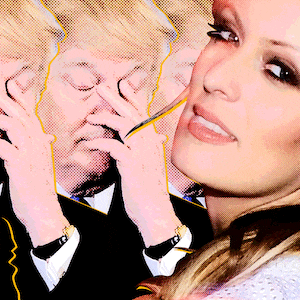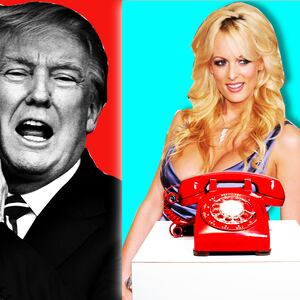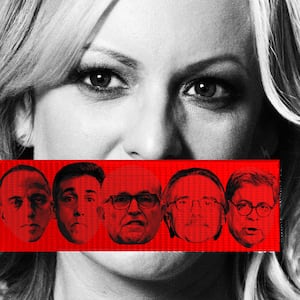Later this month, on October 27, it’ll officially be five years since then-presidential candidate Donald Trump had his personal lawyer secretly pay hush money to porn star Stormy Daniels. And more than an incredible mark of how time can move both fast and slow, it’s also something of an important legal deadline.
Federal prosecutors at the Southern District of New York successfully locked up the Trump fixer who orchestrated the deal, Michael Cohen, who was sentenced to three years in jail for charges related to the payment. But they never went after Trump himself, even though the government made it clear in the Cohen case that Trump was behind it all.
The government’s now-infamous sentencing memo says Cohen “acted in coordination with and at the direction of Individual-1,” meaning Trump. And subsequent disclosures and two tell-all books made that crystal clear.
ADVERTISEMENT
But there’s a five-year statute of limitations on violations of federal elections law—and some think it’s starting to get too late for the feds to indict Trump.
“I’m not surprised. I’m disappointed. In fact, I’m disgusted,” Cohen told The Daily Beast on Tuesday. “I’m disgusted with Republicans, because no matter what their supreme leader elects to do, they justify it and rationalize it.”
Cohen, who was released from prison early to serve out the rest of his sentence under home confinement because of COVID-19 concerns, said he distinctly remembers Democrats saying that “no one is above the law.”
“If, in fact, that adage is true, then Trump, Allen Weisselberg, David Pecker and others... should have all been indicted and incarcerated as I was,” Cohen said.
Five years after the hush money payment—four of which were dominated by Trump’s swirling news cycle—it’s easy to forget the details of the scandal. Fortunately, Stephanie Clifford—who goes by the stage name “Stormy Daniels”—laid out the situation in her 2018 book, Full Disclosure.
Trump met the porn actress at the Edgewood Tahoe Golf Course during a charity event on July 13, 2006. Under the guise of taking her out to dinner, Trump invited her to his penthouse suite, where she recalled Trump greeting her in black silk pajamas and slippers. After berating him for thinking himself Hugh Hefner and spanking him with a magazine, a defeated Trump got dressed and they spent the night talking—until she excused herself for a bathroom break and Trump laid in wait for his prey at the edge of the bed in his undies.
“I lay there, annoyed that I was getting fucked by a guy with Yeti pubes and a dick like the mushroom character in Mario Kart,” she recalled in the book. “He has an unusual penis. It has a huge mushroom head. Like a toadstool.”
In her book, she called the two-minute session “the definition of bad sex.”
The real estate mogul’s wife, Melania Trump, had just given birth to their son, Barron. Trump took the porn star out on a few more dates, dangling the possibility of an appearance on The Apprentice. The deal never materialized.
Fast forward to the waning days of the 2016 presidential election. Daniels was about to strike a deal to sell her story to American Media Inc., owner of The National Enquirer. Cohen’s 2020 book, Disloyal, describes how the “catch and kill” operation to squash the story went down.
He’d use a shell company, which he incorporated in Delaware and later called “Essential Consultants LLC,” as part of a plan “to pay Daniels the money in the most discreet and untraceable way possible.” Cohen has repeatedly said the plan was hatched in close consultation with the presidential candidate and the Trump Organization’s chief financial officer, Allen Weisselberg, who now faces local criminal charges of tax fraud.
“It’s only $130,000,” Trump said, according to Cohen. “Fuck it, Michael. Go talk to Allen and figure it all out… a hundred and thirty thousand is a lot less than I would have to pay Melania.”
“We definitely don’t want any paper trail leading back to the Boss,” Allen Weisselberg later advised.
In the end, Cohen fronted the money by tapping the home equity line of credit for his family’s apartment at Trump Park Avenue. By his own telling, he wired the $130,000 to a trust account managed by Daniels’ Beverly Hills lawyer, and in return, he got Daniels’ signed non-disclosure agreement. The Trump Organization then reimbursed and rewarded Cohen in the form of 11 checks split over the course of a year, totaling $420,000.

At the time these books came out, Trump resorted to calling Daniels “horseface” and using the White House press secretary to dismiss Cohen as “a disgraced felon.”
But what would have been the real source of the action, the U.S. Attorney for the Southern District of New York, amounted to nothing. There’s been silence for years. And it took a federal judge’s order for the office to acknowledge the case was over and finally release FBI documents that detailed Trump’s involvement.
Does Trump still have criminal liability? And will it soon be too late to indict him? The Daily Beast put the questions to a dozen legal scholars across the country.
Most agreed that a five-year clock starts from the date of the payment itself.
“It seems that if the Department of Justice were going to charge Trump, it would do so this month before the statute of limitations on the most significant charges related to the illegally large contribution runs,” said Paul S. Ryan, vice president of policy and litigation at the government watchdog group Common Cause.
Ryan’s signature is on two complaints, one to the Federal Election Commission and another to the DOJ, that tried to hold Trump accountable for the hush money payment.
But other attorneys noted that Trump could be accused of an ongoing conspiracy to violate election laws and defraud the government—one that technically would have ended when Cohen got his final check in December 2017, or when the Trump campaign failed to report the hush payments to the FEC.
“The statute of limitations is indeed staggered, because... like a comic book with frames, so many of the actions were captured as snapshots in time,” said Jessica A. Levinson, a law school professor at Loyola Marymount University.
Trump could be found guilty of conspiracy to violate campaign finance laws for allegedly coordinating the payment with Cohen, and his company could be on the hook for making an illegal corporate contribution to a campaign for cutting Cohen the checks, according to Richard L. Hasen, a law school professor at the University of California-Irvine.
However, like so many other times, Trump could lean on ignorance as a defense.
“Whether Trump personally is on the hook depends on whether he knew the campaign finance laws well enough that a judge would consider his direction to Cohen as ‘knowingly and willfully’ violating the specific provisions of the law,” said University of Colorado associate professor of law Douglas M. Spencer, who noted that Justice Department special counsel Robert Mueller similarly opted against charging Donald Trump Jr. for organizing the Trump Tower meeting to get dirt on Hillary Clinton.
“Mueller said he essentially thought that the Trumps were a rag-tag operation who probably didn’t understand campaign finance law. It’s possible a judge may feel the same way about the $130k payment,” Spencer added.
Neither the Trump Organization, nor Trump’s political camp, nor Weisselberg responded to The Daily Beast’s requests for comment on Tuesday. A spokesman for the U.S. Attorney’s Office in Manhattan also declined to comment.
But there are signs that any federal effort on this matter is long dead. One person familiar with the investigation noted that witnesses have gotten back their electronic devices, something federal agents don’t do until an investigation is completely over.
Two former federal prosecutors told The Daily Beast that the Southern District of New York might not pursue the case for at least two reasons. First, the office did not consider Cohen to be a cooperative witness and might be reluctant to trust him. And second, some question whether such a distinctive Justice Department office—which regularly churns out high-profile cases against terrorists, drug kingpins, and pedofile financiers—should utilize its limited resources on a low-level case, even against a person as prominent as Trump, when it could trigger so many legal hurdles.
Even if the statute of limitations on key criminal charges is nearly up, there’s an argument that the clock shouldn’t have actually started until Jan. 20 of this year. As the world now knows, the Justice Department clings to an internal policy—that is not actual law—that a sitting president can’t be indicted. Ciara Torres-Spelliscy, a law professor at Stetson University, pointed out how “that clearly doesn’t apply to ex-presidents.”
“No one has pardoned Trump. Thus should he be prosecuted, we may finally get a court to opine on whether the presidential immunity from prosecution during his time in office tolls the otherwise applicable statute of limitations,” she told The Daily Beast.
But Richard Signorelli, a former federal prosecutor in Manhattan who mostly worked on narcotics and financial crimes in the early ’90s, said authorities shouldn’t take any chances on making an arrest.
“He should be held accountable as soon as possible. Enough time has passed. The time has come,” Signorelli said.









